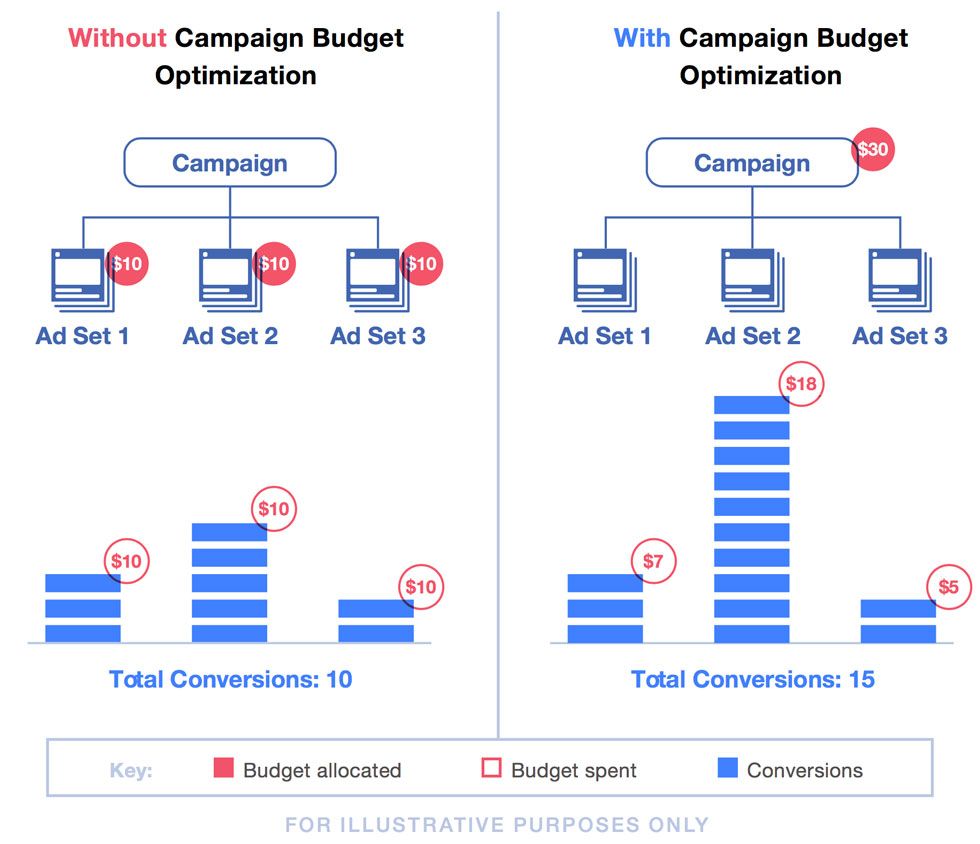How is Eventbrite Boost's Optimization different from Facebook's Campaign Optimization?
When Facebook’s new Campaign Budget Optimization feature was announced, it was introduced as a new way to manage ad budgets and ensure optimal results.
What is Campaign Budget Optimization?
Using campaign budget optimization, Facebook advertisers set a budget at the campaign level that will then be optimized to distribute across ad sets to favor the highest performers.
Here’s how Facebook itself describes the process:
By distributing more of a budget to the highest performing ad sets, advertisers can maximize the total value of their campaign. Budget optimization works in real time to determine the most effective use of a business’ ad dollars to help lower cost per result and increase return on ad spend.
Campaign budget optimization also saves advertisers time by eliminating the need to manually shift budgets between ad sets.

Now that most advertisers have access to this new feature, I've encountered some limitations.
Limitations with Facebook's Budget Optimization
Optimization is largely dependent on the initial conversions.
Facebook's algorithm only optimizes based on information that's immediately available. This means the system can make decisions prematurely, based on conversions that are happening in one ad set and not others.
Here's an example: An advertiser launches an ad campaign optimizing for a purchase conversion event. Within the beginning hours of the campaign, one small audience converts a sale. Budget is then optimized and as a result, 4 audiences receive minimal ad spend and a large sum is spent on the remaining small audience.
In many cases, an ad set can yield more conversions at a lower cost later in the campaign. Some audiences take time to achieve ideal saturation; changing the budget too soon means the audience that could actually perform best is not given the chance to do so.
Optimization does not take advantage of other high-quality signals.
Facebook's algorithm only relies on the final conversion event as the signal for making a change in the budgets of ad sets. Budget optimization needs to look at the bigger picture rather than the tail end of the marketing funnel. Optimizing budgets based on just one event means suffocating other ad-sets that exhibit healthy funnels, which could yield higher performance.
Here's an example: An advertiser launches a new ad campaign optimizing for a purchase conversion event. After the campaign has ended, we see the following results.
Audience 1 received 80% of campaign's budget (Ad Spend), 5 Purchase events, and 10 Add to cart events
Audience 2 received 10% of Ad Spend, 1 Purchase event, and 45 Add to cart events
Audience 3 received 10% of Ad Spend, 1 Purchase event, and 3 Add to cart events
In this case, Facebook's Campaign Budget Optimization did not consider any signals other than purchase events. Audience 2, which had better success finding people likely to buy, didn't get the budget it needed to win more purchasers.
These other high-quality signals, along with data from past ad campaigns, should be leveraged to deliver advertisers a more robust method of protection from inefficient spend.
Eventbrite Boost's Optimization Engine
We've designed a solution to address these limitations.
Eventbrite Boost’s Optimization Engine analyzes the performance of past ad campaigns and multiple high quality signals of live campaigns using conversion tracking with A/B testing. The end result maximizes the performance of ad campaigns by learning from data and delivering more desired actions to the advertiser.
Learning from past performance
Past ad campaigns are an indicator of the quality of each conversion event. The more you advertise, the more data the Optimization Engine can leverage to learn the optimal signals for your future ad campaigns.
The engine begins by analyzing the performance of all past campaigns. After filtering campaigns by objective and reviewing conversion data, the engine will divide the summation of each conversion type by the advertiser's desired action. This will result in a weight for each conversion event.
Analyzing and applying each data point
While the campaign is live, the engine multiplies each conversion event by its weight to get the conversion score. For each audience in the campaign, the summation of the conversion score is divided by the amount spent on the audience. This results in the total advertiser value per dollar spent on the audience. This information is used to calculate the remaining budget portion for each audience in the campaign.
By considering the length of your campaign, initial signals indicate the potential of your audiences to convert sales in the future. High-quality signals determine spending ratios that are continuously updated and applied to the campaign's budget.
Conclusion
By using Eventbrite Boost's Optimization Engine, advertisers can take advantage of more data and automatically apply complex Facebook ad management strategies to their campaigns. With spend increasing every month on Facebook ads, this solution provides a more robust option for advertisers to protect against wasted spend.
Last updated